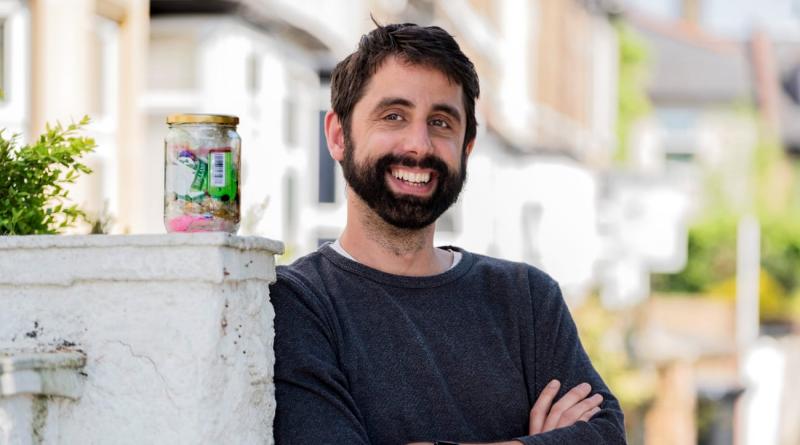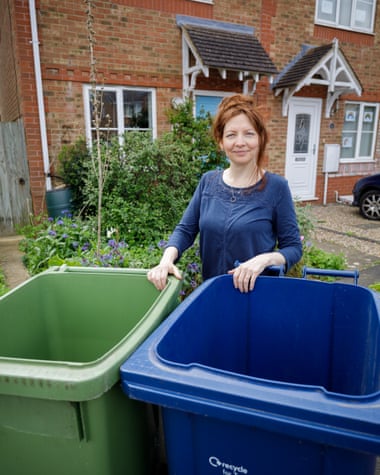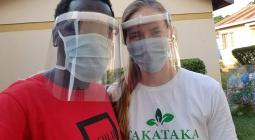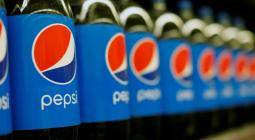Zero-waste warriors: meet the people whose household rubbish fits in a jam jar.

From making their own toothpaste to foraging locally for edible plants, more and more people are learning to cut the amount of rubbish they throw out. Here’s how they do it
Ander Zabala, recycling manager for Hackney council, London
Through my work, I have seen the huge amount of waste and recycling that we produce. Watching an incinerator for half an hour shocked me and made me want to take action. I was standing on a balcony wearing a full body suit and goggles watching gigantic grabbers emptying waste from trucks. The scale is so shocking and you realise how tiny we are compared to the amount of waste we create. I don’t want to contribute to that wastefulness and it has made me want to take action.
In 2018, I did the Zero Waste Week challenge and then kept going. I set myself a goal for 2019 of not having any waste collected. I made that commitment on social media, so I felt invested. Instead of using a bin, I put my waste in a jar each month so that I could see what I was throwing away. I also reduced the amount I was recycling.
I look at waste from a data perspective. At the end of 2019, I opened all the jars of non-recyclable waste I was keeping. They weighed a total of 5.72kg for the year. The average London house produces 10kg of waste a week, compared with my household’s weekly average of 0.11kg. So our waste was 99% less than the average.
My husband and I get a veg box delivery from Riverford every week. I buy most other things loose from my local corner shop and other bits from a nearby Bulk Market and Turkish supermarket. I bring my own containers and bags to fill with cereals, flour, pasta, rice, tofu, sugar, coffee beans, lentils, spices and more. I also refill my shampoo, washing-up liquid, laundry liquid and toilet cleaner bottles. I also get bottle refills of wine from a local shop.
At first I felt a bit weird taking my own containers, but it forces you to explain what you are doing to people around you. Generally, people are really positive and say: “What a great idea.” I take tubs back to my Indian takeaway to be refilled and now they expect it. Of course, at the moment I wouldn’t ask them to refill my containers because everyone is taking hygiene precautions due to the coronavirus, but I still use the tubs for my regular grocery shopping. My recycling has increased during lockdown because I cannot reuse things as much as I normally would.
One of the biggest lifestyle benefits has been using my local shops more. I used to go to the supermarket and self-checkout, but I have gained so much by talking to local shop owners and cashiers.
We have also done a lot more cooking, especially making things that we can’t buy without packaging. My husband learned to make chapatis and naan bread, and they taste better than the ones we bought in the shops – and he can make them in minutes. We make our own oat milk, which is so cheap and easy. I will buy a packet of biscuits occasionally because I don’t have the time to make everything.
Sometimes, I would get a bit militant. I would ask friends at parties: “Why did you buy that when it can’t be recycled?” Or I would find some plastic packaging in the house and text my husband saying: “What is this?” I have been called the zero-waste police. But now I am going a bit easier on myself and others.
Overall, these changes have saved us a lot of money, mainly by reducing our consumption. We stopped buying stuff that we don’t really need, but spend a little more on the things that we do buy. We have also eaten more healthily because we have bought less processed food.
I am still putting my waste in a jar to keep it visible. I know that if there is a large bin in the room, people will use it.
Cate Cody, jazz singer and Green councillor, Tewkesbury
We haven’t put our waste bin out for collection for more than three years, not since January 2017. My partner and I have one small metal bin in the kitchen and that’s the only bin in the house. There’s hardly anything in it, just occasional bits of non-recyclable plastic packaging, usually from gifts from well-meaning people.
We try to bring in as little as possible, only buying what we need and secondhand wherever feasible, which tends to avoid packaging. We reuse, repurpose, recycle and compost.

We get a weekly veg box full of local, seasonal produce. I forage too, for things such as nettles and wild garlic. We grow our own salad, which is very easy and quick to grow. Our rocket sprouts up between paving slabs.
We buy other food, such as pasta, rice and pulses, in bulk from an ethical cooperative wholesaler called Suma. We get a delivery every couple of months that we share with five other friends. Our oats come in a 10kg paper sack. The toilet paper comes in biodegradable packaging that goes into the compost, and there’s biodegradable dental floss too.
We use loofahs instead of regular sponges for washing up because they are made from a natural material and can be composted afterwards. They are more expensive, but we find they last longer, so the costs are not so different.
Once you start to reduce your waste, you notice the outstanding things still going into the bin and then seek alternatives to them. When you put your mind to it, you can find a solution for nearly everything. One challenge was what to do with an old bike inner tube. I considered a few possibilities and eventually made it into a tool belt.
I hated toothpaste tubes going to landfill, so I started making my own toothpaste by mixing bicarbonate of soda with coconut and peppermint oil. It is very different, but it works. That said, we have now made Tewkesbury town hall into a collection point for recycling toothpaste tubes so that others needn’t end up in the bin.
I never buy wrapping paper. For close friends and family I will use a scarf or a table cloth and they usually give it back afterwards. Recently, I wrapped a friend’s present using recipes from a newspaper tied up with string and explained that the recipes (chosen especially) were part of the present. They loved it.
I happily use a bar of soap instead of shower gel and wouldn’t look back. The gel often slid straight down the plughole anyway. A decent soap lasts much longer.
Instead of kitchen roll, I use old cloth, and rather than makeup wipes, I use a small hankie or a piece of cloth. These can all be washed.
I don’t miss the things that I have given up. It is not about loss, it is about what you gain. I derive real satisfaction from not throwing things away and I have gained skills by learning to make things myself. It is also about owning fewer things; if I want to read a book, I will order it from the library. I might have to wait longer for it, so there is less instant gratification, but it can feel like being a child waiting for Christmas and it is all the more rewarding when it arrives.
As a jazz singer I recycle songs, and in the rest of my life I try to recycle everything else.
Claudi Williams, workshop manager for the Beeswax Wrap Co, Stroud
I was frustrated by the amount of plastic in my life, so in 2016 I decided to try not buying any for a year. It was a steep learning curve for me, my husband and our two sons but, after a few months, our waste went down to almost nothing. It has become our new normal.
It was hard at first because we were used to the convenience of buying stuff at the last minute and we couldn’t do that any more. Now we have a routine, cooking every day and making our own packed lunches.
The first thing we ask ourselves is: “Do we need this?” The second is: “How can I get this unpackaged?” Can we make it ourselves? Can we get it secondhand? Can we borrow it?
Buying unpackaged food tends to make you buy more local, seasonal food, which also reduces your food miles, thereby creating a virtuous circle. We buy food from the farmers’ market and local shops.
When we started, I did a little audit around the house to see how many cleaning products we were using and the result was staggering. We are led to believe that we need a different product for every single thing we clean, but actually you can clean nearly everything effectively with bicarbonate of soda, vinegar, lemons and a simple soap. Now I just use soap and a brush and make my own spray with vinegar for things such as tiles, mirrors and sinks. The whole journey has been one of simplifying further and further. Bicarb is a great thing to have around – for example, you can sprinkle it into tea-stained cups to remove the stains.
You can make so many things from basic ingredients, and finding new solutions is hugely empowering. For instance, when we needed windscreen wiper liquid for the car, I found a really easy recipe on the internet that cost only a few pence to make. I make my own toothpaste and deodorant, which only takes five minutes. For shampoo, I buy Faith in Nature refills or a bar from Mind the Trash. I use a metal safety razor for shaving. I get toilet paper from a subscription service called Greencane that sends out 48 unpackaged rolls in a cardboard box.
I love herbal teas and was scrambling around for loose tea and then I realised that there were plants in my garden that I could pick fresh and use. You have to switch your brain away from consumption and realise what is in your environment. I dry herbs such as chamomile and peppermint to use in the winter months by tying bunches in a posy and hanging them upside down in a cupboard.
Living like this has really changed me. Ultimately, we simply live with less stuff. I used to pop things into my supermarket trolley on impulse, but now I have a totally different relationship with what I want and need. I feel much more self-reliant and smarter about how I shop. I consider every purchase a vote.
10 easy ways to start reducing your waste
1. Buy less stuff. If you have to buy furniture, clothes or tools and whatever else, try to get it secondhand, or borrow rather than buy.
2. For groceries, choose loose and unpackaged fruit and vegetables. Take your own reusable containers and bags to markets or deli counters to get things such as olives, cheese and bread package-free. Buy milk in returnable glass bottles or make your own plant-based milk.
3. Try making things that you find difficult to source unpackaged, such as biscuits, granola, hummus, bread and pizza. Popcorn is easy to make from kernels.
4. See what food you can grow or forage from your surroundings. Salad can be grown in window boxes.
5. Get rid of the plastics in your bathroom by using a bar of soap instead of shower gel, and try shampoo refills or a shampoo bar. You can make your own toothpaste and deodorant or source low-impact alternatives.
6. Reduce your sanitary waste with reusable washable cloth nappies rather than disposables. Use a Mooncup, reusable pads or special period pants instead of single-use tampons or sanitary towels.
7. In the kitchen, try a loofah or coconut scrub for washing up rather than a sponge. They are natural, biodegradable and can be composted after use. Get refills of washing-up liquid and make your own simple cleaning spray for surfaces.
8. Ditch tissues, kitchen towel and makeup wipes and use hankies and washable cloth options instead.
9. Compost and recycle whatever you can and seek out extra local recycling points for items such as crisp packets, toothbrushes, textiles and batteries. Some supermarkets collect types of plastic that can’t be put in household recycling.
10. Repair items before buying new ones. With things that are beyond repair, consider how you might be able to repurpose or reinvent them. For example, you could cut up old clothes to make beeswax wraps for food or fabric bags for collecting loose groceries.
6 May 2020
The Guardian






